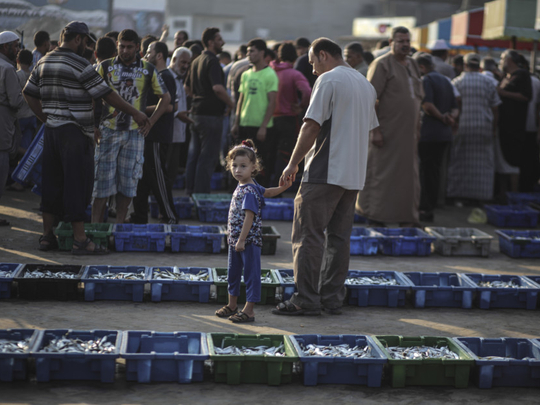
Gaza: The beach has long provided much needed relief for the 2 million residents of the Gaza Strip, cut off from the rest of the world. They come to swim, play soccer, relax, or as many poetically put it — speak to the sea.
“It’s like talking to a friend, one that won’t gossip,” said Etaf Eleiwa, emerging from the waves. “It washes away the stresses and the problems.”
But the usually packed beaches are less crowded this summer. The brown hue that stains the water for several hundred meters out to sea makes clear why, as does the putrid stench that punctuates a drive down the coast.
Some 100,000 cubic metres of raw or partially treated sewage have flowed into the sea each day since early summer, when Palestinian President Mahmoud Abbas asked Israel to cut the power supply to Gaza amid a worsening feud with Hamas, the militant movement that controls the enclave. The power shortage means that sewage treatment plants can’t function.
The pollution is so bad that Israel has shut down neighbouring beaches for safety reasons and called on the Palestinian Authority to find a solution. President Donald Trump’s Middle East envoy, Jason Greenblatt, raised the issue in a speech in New York last week, saying the untreated wastewater was “imposing unnecessary hardship on both sides.”
But for Gaza, the polluted waters compound the wretchedness for residents already strangled by restrictions on movement and trade by neighbouring Israel and Egypt. The densely packed enclave suffers one of the highest unemployment rates in the world, and its education and health services are deteriorating as it struggles to recover from repeated wars.
“The sea is the only way to breathe in Gaza,” said Rami Al Habil, a 38-year-old fisherman, as he sold boxes of sardines at the port. “Our lives are under blockade.”
He said fishermen were already struggling to make ends meet under Israeli restrictions on fishing that prohibit Palestinian boats from going more than six nautical miles from the shore.
Fisherman insist they fish beyond the pollution, but some Gazans still fear eating their catch.
Gaza is famed for its seafood, which often comes with a fiery sauce. Before Hamas took hold of the strip in 2007, Gaza exported fish to Israel and the West Bank. Since then, Israel and Egypt, which share the only land boundaries with Gaza, have imposed a partial blockade.
“The stereotype now is that the sea is polluted,” said Ashraf Hissi, a 42-year-old fisherman at Gaza’s port. He said that fewer people are buying because of the pollution. Others simply can’t afford it. In an effort to squeeze Hamas, the Palestinian National Authority also reduced the salaries of tens of thousands of its workers in Gaza by about a third.
Some days Hissi loses money. “I feel like I’m just exchanging cash for cash,” he said.
It’s crab season in Gaza and fisherman line the road that hugs the shoreline selling their catch to passers-by. But this year, Farid Ashour is steering clear of the local favourite.
“When we drive past, my children keep on asking me to buy crab, they love it,” he said of the blue-legged crustaceans known in Gaza as “Abu Jalambo.”
“But I can’t because I know what they eat and where they fish them.”
As director of sanitation at the Gaza Coastal Municipalities Water Utility, he is acutely aware of the water pollution problem.
In recent weeks, there have been signs that the crisis may soon ease. Palestinian Prime Minister Rami Hamdallah is expected to travel to Gaza on Monday as reconciliation efforts between Hamas and rival party Fatah progress after a 10-year split that began after Hamas won elections in Gaza, later seizing control.
In an effort at reconciliation, Hamas recently announced it would dismantle its administrative committee in Gaza, which essentially functions as a government, caving to a demand of Abbas after talks brokered by Egypt.
Hamas also said it was ready to hold elections and called on a unity government to take up duty in Gaza. So far, however, Abbas has not reciprocated by lifting punitive measures aimed at Hamas.
Even if he does, Gaza’s power and water-treatment woes are long-standing.
Water treatment projects have been held back by issues including war, financing and Israeli restrictions. Greenblatt also laid blame on Hamas for diverting funds for military uses instead of paying the Palestinian National Authority for services.
“We are 21 years behind the need,” Ashour said, pointing out that construction on a new plant first planned in 1996 has only just started.
It will have a solar system installed so it can continue to treat water during power cuts.
Gaza’s environment authority classes 63 per cent of its 25-mile coastline as seriously polluted and says waterborne diseases are increasing.
“It was there before, but it wasn’t so obvious,” Ebrahim Al Amasi, a 25-year-old lifeguard said of the pollution as he surveyed a largely empty beach. “Now it’s on a daily basis.”
Eleiwa, 45, and her five friends decided to risk a swim anyway. It was their first of the summer. The sea looked cleaner than on other days, they said. The nearest outlet pipe, just 500 meters down the beach, wasn’t flowing.
On previous trips to the beach, they had watched from the sweltering sand with frustration.
“It’s a risk, but what can we do?” said Eleiwa’s friend, Awatif Sukkar, as they walked to beach huts to dry off.
Amasi said there is supposed to be a ban on swimming, but it isn’t enforced.
“Our life is the sea, we are like fish in the sea,” he said. “It’s like oxygen for the people.”












